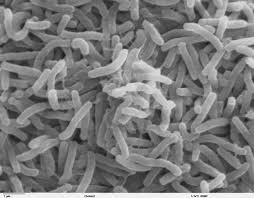cholera

n. [内科] 霍乱
n.
[医]霍乱;虎疫;
英英释义
cholera[ 'kɔlərə ]
n.an acute intestinal infection caused by ingestion of contaminated water or food
同义词:Asiatic choleraIndian choleraepidemic cholera
词组短语
cholera epidemic霍乱蔓延
双语例句
用作名词(n.)
People began to feel alarmed about the cholera.
人们开始对霍乱感到惊恐起来。
Have you had your cholera jabs yet?
你打霍乱预防针了吗?
权威例句
Cholera.Cholera.
Cholera.
The Origin of the Haitian Cholera Outbreak Strain
Global Climate and Infectious Disease: The Cholera Paradigm*
Dna Sequence Of Both Chromosomes Of The Cholera Pathogen Vibrio Cholerae
Lysogenic conversion by a filamentous phage encoding cholera toxin
Structure and function of cholera toxin and the related Escherichia coli heat-labile enterotoxin.
Pituitary hyperplasia and gigantism in mice caused by a cholera toxin transgene
Mechanism of cholera toxin action: Covalent modification of the guanyl nucleotide-binding protein of the adenylate cyclase system
Use of phoA gene fusions to identify a pilus colonization factor coordinately regulated with cholera toxin.
Thiazolidinone CFTR inhibitor identified by high-throughput screening blocks cholera toxin-induced intestinal fluid secretion
The small RNA chaperone Hfq and multiple small RNAs control quorum sensing in Vibrio harveyi and Vibrio cholera
cholera
cholera: [14] Greek kholéra originally meant ‘illness caused by choler, bilious attack’; it was a derivative of kholé ‘bile’ (which is related to English gall). Passing into Latin as cholera, it began to be used for ‘bile’ itself, both in the physiological sense and as representing one of the four ancient humours, ‘anger’. It had that sense when first adopted into English, and into French, where it became colère (source of English choler [14]).It was revived as a term for a severe digestive disorder, involving vomiting, diarrhoea, etc, in the 17th century, and in the 19th century was applied (from the similarity of the symptoms) to the often fatal infectious disease caused by the bacterium Vibrio comma.=> gall, melancholy
cholera (n.)
late 14c., "bile, melancholy" (originally the same as choler), from Middle French cholera or directly from Late Latin cholera, from Greek kholera "a type of disease characterized by diarrhea, supposedly caused by choler" (Celsus), from khole "gall, bile," from khloazein "to be green," from khloros (see Chloe). But another sense of khole was "drainpipe, gutter." Revived 1560s in classical sense as a name for a severe digestive disorder (rarely fatal to adults); and 1704 (especially as cholera morbus), for a highly lethal disease endemic in India, periodically breaking out in global epidemics, especially that reaching Britain and America in the early 1830s.
1. There have been no more notifications of cholera cases in the last week.
上星期已没有霍乱病例的报告.
-- 来源 -- 英汉 - 辞典例句
2. give a person a cholera immunization
给某人打霍乱预防针
-- 来源 -- 英汉 - 辞典例句
3. The area was struck by an outbreak of cholera.
该地区突然发生了霍乱.
-- 来源 -- 英汉 - 辞典例句
4. Have you been inoculateed (against cholera) ?
你打了霍乱的预防针了吗 ?
-- 来源 -- 英汉 - 辞典例句
5. have an inoculation against cholera
打霍乱预防针
-- 来源 -- 英汉 - 辞典例句
6. an isolated case( of cholera)
(霍乱的) 孤立病例
-- 来源 -- 英汉 - 辞典例句
7. Cholera is spread by Contagion.
霍乱因传染而扩大。
-- 来源 -- 英汉 - 辞典例句
8. The pig is the only animal in which hog cholera is known to occur naturally.
猪是已知自然发生猪瘟的唯一动物。
-- 来源 -- 英汉 - 辞典例句
9. Have you had your cholera jabs yet?
你打霍乱预防针了吗?
-- 来源 -- 英汉 - 辞典例句
10. In 1854, a localized epidemic of Asiatic cholera broke out in London.
一种地方性传染病――亚细亚霍乱于1854年在伦敦爆发。
-- 来源 -- 英汉 - 辞典例句
